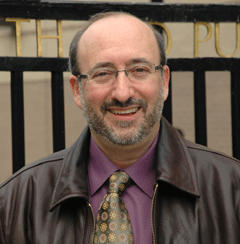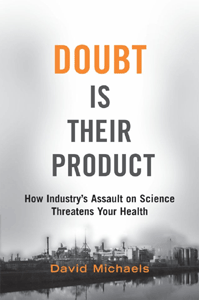Manufacturing Uncertainty
Air Date: Week of May 2, 2008

Author David Michaels (Photo: Dawn Garrott, The George Washington University Medical Center)
By raising questions about the scientific research on how some chemicals affect human health, the corporations that manufacture them are able to stall the governmental regulatory process, says Dr. David Michaels of the George Washington School of Public Health. Dr. Michaels talks with host Bruce Gellerman about his new book, “Doubt is Their Product: How Industry’s Assault on Science Threatens Your Health.”
Transcript
GELLERMAN: Well the spotlight, if not the interrogation lamp, is on the government agencies that are supposed to safeguard public health from toxic chemicals. David Michaels served as a senior official in one of those agencies. He now directs the Project on Scientific Knowledge at George Washington University’s School of Public Health. In his new book, “Doubt is their Product: How Industry’s Assault on Science Threatens your Health,” Professor Michaels charges companies are actively manufacturing scientific uncertainty to confuse lawmakers and the public.
MICHAELS: This has become a big industry. What polluters have seen is that the strategy that the tobacco industry came up with, which essentially is question the science, find the controversy, and magnify that controversy, is very successful in slowing down public health protections. And so the scientists who used to work for the tobacco industry are now working for most major chemical companies – certainly the big polluters – creating studies that show the opposite of studies done by government regulators and government scientists. They don’t have to show a chemical exposure is safe – all they have to do is show that the other studies are in question somehow. And by raising that level of uncertainty, they throw essentially a monkey-wrench into the system.

What’s happening above that, though, is the Bush administration is institutionalizing that uncertainty. They’re building in structures in the regulatory process, in the information flows within the government, to magnify that uncertainty and say, well, if there’s uncertainty, if there’s disagreement, we’ll stop, we’ll do more studies, we’ll do more reviews, we’ll make sure everybody involved agrees on the science, which of course they won’t, and everything is just stopped; it’s paralysis by analysis.
GELLERMAN: Well, you worked in the Clinton administration. You were the assistant secretary in the Department of Energy for environment, safety, and health. Did you see this going on during the Clinton administration?
MICHAELS: I did. In fact, that’s why I got involved in this question, and that’s why I wrote my book, “Doubt Is Their Product.” I was the regulator at the nuclear weapons complex, in charge of protecting the health of workers, the communities, the environment around the nation’s most dangerous facilities. Industries that produced products we used – dangerous products – would send in studies that I knew were just nonsense, that pretended to say these things were safe, when we knew in fact they were dangerous. My whole staff would look at these and say, well we know it’s just company X doing this work – of course they’re lying. Unfortunately now in the Bush administration, those studies are elevated to equal status of the better studies that are done by independent scientists. The two sets of studies are virtually used to cancel each other out and stop the Environmental Protection Agency from protecting the health of Americans.
GELLERMAN: Let’s talk about a chemical that’s in the news lately. It’s called bisphenol A, and there was a study that showed that it had a neurotoxic effect on fetal development. Congress is investigating the way industry behaves with these studies, because they say that they influence some of the studies around this chemical.
MICHAELS: That’s right. Congress is looking at what they’re calling ‘science for sale,’ and it’s a reasonable term. What the bisphenol A industry has done is hired a product defense consulting group, a group that’s worked for decades for the tobacco industry, essentially to help shape the national debate over this chemical, and to promote the small number of studies that were done by industry that show no effect, and trying to convince the government and the public to ignore the well over 100 studies that show that low-dose exposure to bisphenol A has a deleterious impact. But what it looks like at the end is equal and opposite studies, with an attempt essentially to paralyze any sort of forward movement on that.
GELLERMAN: You know Senator Barbara Boxer held hearings recently about a new government accountability office report that says that the EPA isn’t doing its job in regulating and testing chemicals. She said that just four out of 70 backlogged chemicals were evaluated last year?

Author David Michaels. (Photo: Dawn Garrott, The George Washington University Medical Center)
MICHAELS: That’s right. There are EPA scientists who are doing their best to turn out credible assessments of these chemicals. And then they run up against the political appointees at the top of the EPA and the White House, who are being told by, essentially, corporations what to do, and they kill all of these assessments, these evaluations. The EPA is essentially paralyzed.
GELLERMAN: You know, Professor Michaels, when a person hears this, they’re gonna say, my government has been infiltrated and is broken, fundamentally broken. In your book you actually quote comedian Lily Tomlin, and she says, ‘no matter how cynical you are, it’s never enough to keep up.’ So my question to you is what’s a person to do?
MICHAELS: Bruce, that’s a very good question. It’s certainly enough to make you very cynical. We need a lot more transparency, and I’m hoping that the next administration, the next president, whoever that is, guarantees that all of these decisions around how we regulate chemicals, how we measure the effects on people’s health, are done in a way that’s transparent. Everybody should see how these decisions are made. The Bush administration is notorious for its devotion to secrecy. In fact there’s every reason to think right now the shredders are all going right now, so we’ll never be able to figure out exactly who made these decisions, how, and why. But the next administration’s gonna have to clean this up.
GELLERMAN: David Michaels directs the Project on Scientific Knowledge and Public Policy at the School of Public Health and Health Services at George Washington University. His latest book is called “Doubt Is Their Product: How Industry’s Assault on Science Threatens Your Health.” Thank you very much, Professor Michaels.
MICHAELS: Thank you so much for having me on.
Links
To read secret government documents used in David Michaels' book, click here
Living on Earth wants to hear from you!
Living on Earth
62 Calef Highway, Suite 212
Lee, NH 03861
Telephone: 617-287-4121
E-mail: comments@loe.org
Newsletter [Click here]
Donate to Living on Earth!
Living on Earth is an independent media program and relies entirely on contributions from listeners and institutions supporting public service. Please donate now to preserve an independent environmental voice.
NewsletterLiving on Earth offers a weekly delivery of the show's rundown to your mailbox. Sign up for our newsletter today!
 Sailors For The Sea: Be the change you want to sea.
Sailors For The Sea: Be the change you want to sea.
 The Grantham Foundation for the Protection of the Environment: Committed to protecting and improving the health of the global environment.
The Grantham Foundation for the Protection of the Environment: Committed to protecting and improving the health of the global environment.
 Contribute to Living on Earth and receive, as our gift to you, an archival print of one of Mark Seth Lender's extraordinary wildlife photographs. Follow the link to see Mark's current collection of photographs.
Contribute to Living on Earth and receive, as our gift to you, an archival print of one of Mark Seth Lender's extraordinary wildlife photographs. Follow the link to see Mark's current collection of photographs.
 Buy a signed copy of Mark Seth Lender's book Smeagull the Seagull & support Living on Earth
Buy a signed copy of Mark Seth Lender's book Smeagull the Seagull & support Living on Earth

